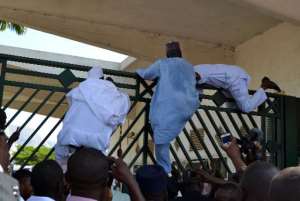
Abuja (AFP) - Nigerian police fired teargas inside parliament on Thursday, apparently trying to block opposition lawmakers, including the speaker of the lower house, from entering for a key security vote.
In the fracas, lower house members rejected a government request to extend emergency rule in the northeast region hit hardest by Boko Haram, and announced that the special powers had expired.
The country's main opposition party had said it opposed prolonging the state of emergency, describing it as a complete failure that had failed to curb Islamist violence.
Boko Haram were suspected of killing at least 45 people on Wednesday in an attack on the village of Azaya Kura in the Mafa area of Borno state, local government officials and residents said.
The caretaker chairman of Mafa local government area, Shettima Lawan called the attack, which also left at least 50 injured, "wicked and despicable".
Political tensions have ratcheted up before elections due in February next year and Senate President David Mark, a ruling party stalwart, ordered the immediate closure of both chambers over the teargas incident.
The focus of the police aggression appeared to be lower house speaker Aminu Tambuwal, whose defection to the All Progressives Congress (APC) last month outraged the ruling Peoples Democratic Party (PDP).
The PDP has tried to remove Tambuwal from the speaker's chair and stripped him of his security detail.
- Climbing gates -
Tambuwal's spokesman Imam Imam said the speaker arrived at parliament at about 10:00 am (0900 GMT) before the vote on the emergency extension, which President Goodluck Jonathan said was vital to end the insurgency.
The APC has described the strategy as a complete failure, noting the huge Islamist gains in territory since emergency rule was first imposed in May 2013.
Imam said Tambuwal was moving in a convoy with more than 40 other lawmakers, which police repeatedly tried to stop as they approached the main gate of parliament.
The convoy pressed through several police barricades before officers locked the gate that leads into the parliament complex, he added.
Lawmakers began pushing aggressively on the bars to force their way through, with police looking on from the other side, television pictures showed.
Several scaled the gate and then walked with Tambuwal towards the legislative building.
"As soon as we got (to parliament), they insisted he will not enter the chamber," Imam told AFP.
"It was in that midst of confusion that they now used the tear gas on the speaker" and other lawmakers, he added.
An AFP correspondent said the main lobby outside the lower house chamber was filled with tear gas, with bystanders choking as they tried to find their way outside.
Police spokesman Emmanuel Ojukwu said officers were acting on reports that "hoodlums and thugs" had planned an "invasion" of parliament.
He claimed that Tambuwal and his allies defied police orders, assaulted officers and were to blame for the escalation in tensions.
- 'Emergency rule over' -
Senate president Mark described the chaos as "a very unfortunate incident" and closed both chambers of the National Assembly until Tuesday.
The PDP said in a statement that "the violence by some lawmakers" was "embarrassing" and distanced itself from the rumpus.
But House of Representatives spokesman Zakaria Mohammed said later that the chamber held a brief session before the parliament was shut and decided to reject the state of emergency extension.
"Emergency rule is over as far as we are concerned," he told AFP. No vote was taken and the decision came in a closed-door session.
Mohammed explained that the president was still free to deploy troops "to trouble spots" in the country.
The president needs approval from both chambers to secure an extension but losing the emergency powers has little practical impact on the fight against Boko Haram as its purpose was never spelt out.
The PDP, which has controlled the government since democracy was restored in 1999, has found itself in uncharted waters in recent months following a wave of lawmaker defections to the APC.
While the PDP currently holds fragile majorities in both chambers, the situation has been in flux throughout the year.
The defection of Tambuwal was seen as blow to Jonathan, who had previously relied on a compliant lower house.
Human rights lawyer Jiti Ogunye said Thursday's fracas recalled the years after Nigeria's independence from Britain in 1960, when a divided civilian government was ultimately overthrown by the military.
"We are in a state of anarchy," he said. "This is how sad our democracy has turned."




 We’ll no longer tolerate your empty, unwarranted attacks – TUC blasts Prof Adei
We’ll no longer tolerate your empty, unwarranted attacks – TUC blasts Prof Adei
 Bawumia donates GHc200,000 to support Madina fire victims
Bawumia donates GHc200,000 to support Madina fire victims
 IMF to disburse US$360million third tranche to Ghana without creditors MoU
IMF to disburse US$360million third tranche to Ghana without creditors MoU
 Truck owner share insights into train collision incident
Truck owner share insights into train collision incident
 Paramount chief of Bassare Traditional Area passes on
Paramount chief of Bassare Traditional Area passes on
 Two teachers in court over alleged illegal possession of BECE papers
Two teachers in court over alleged illegal possession of BECE papers
 Sunyani: Victim allegedly shot by traditional warriors appeals for justice
Sunyani: Victim allegedly shot by traditional warriors appeals for justice
 Mahama vows to scrap teacher licensure exams, review Free SHS policy
Mahama vows to scrap teacher licensure exams, review Free SHS policy
 Government will replace burnt Madina shops with a new three-story, 120-store fac...
Government will replace burnt Madina shops with a new three-story, 120-store fac...
